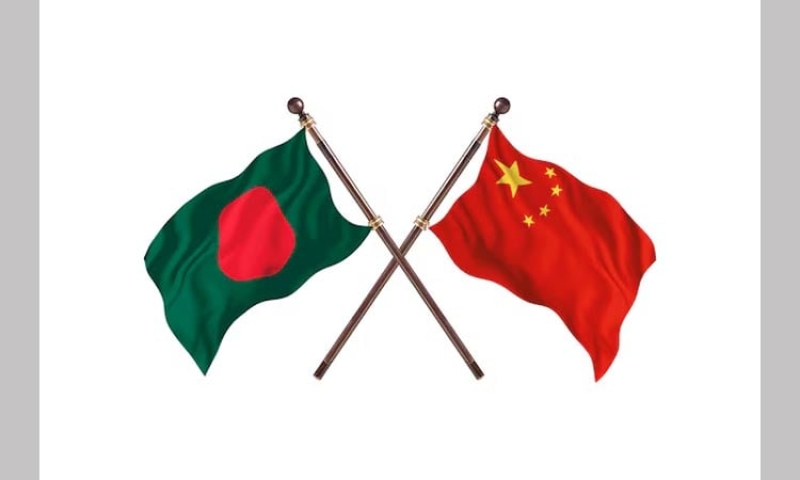- World Bank to Provide $150.75m for Bangladesh RAISE Project |
- Press Secretary Alleges Indian Media, AL Spread Disinformation |
- Hasina Gets 10 Years in Purbachal Plot Corruption Cases |
- NASA Finds Ammonia Compounds on Jupiter Moon Europa |
- Remittance Inflow Surges 45% to $3.17bn in January |
Touhid’s China Visit Seeks to Strengthen Dhaka-Beijing Ties

Foreign Adviser Md Touhid Hossain embarked on his first official bilateral trip to China today, aiming to deepen and diversify the strategic partnership between Dhaka and Beijing. The five-day visit will focus on key issues such as renegotiating loan interest rates, fostering medical collaboration, facilitating hydrological data exchanges, and seeking China's active role in resolving the Myanmar-Rohingya crisis.
Invited by Chinese Foreign Minister Wang Yi, this trip is being hailed as a milestone in Bangladesh-China relations—particularly as it marks the first official bilateral visit since the interim government, led by Prof. Muhammad Yunus, took office in August last year. Foreign policy experts have characterized this visit as a significant opportunity to further strengthen ties with one of Bangladesh’s most important economic and geopolitical partners.
On Tuesday, Touhid will hold high-level bilateral talks with his Chinese counterpart in Beijing. Chinese Ambassador to Bangladesh Yao Wen has suggested that Beijing is prepared to sign an agreement on hydrological data exchange, responding to Dhaka's longstanding request. The visit is also expected to include discussions on China’s potential involvement in the Teesta River project, a critical initiative for Bangladesh.
The decision to prioritize China for his first overseas visit signals a shift in diplomatic tradition, as previous administrations often favored India as the first destination for foreign ministers due to geographical and historical ties. This visit reflects Bangladesh's intent to expand its global partnerships beyond its immediate neighbors.
In addition to official talks, Touhid is set to meet with Chinese Communist Party leaders and deliver speeches at the China Institute of International Studies and the Shanghai Institute of International Studies. He will also engage with business leaders in Shanghai to attract more Chinese investment into Bangladesh.
Ahead of the trip, Ambassador Yao briefed Touhid on key issues, reaffirming China’s support for Bangladesh’s sovereignty, territorial integrity, and development efforts. Yao also reiterated China’s commitment to Bangladesh’s democratic transition and economic growth.
Economic and Development Cooperation
China has become a major investor in Bangladesh, especially in infrastructure, but concerns over high loan interest rates and terms have surfaced. A central objective of this visit is to negotiate more favorable loan conditions, including reducing interest rates from 2-3% to 1%, extending grace periods, and waiving commitment fees for ongoing and future projects. Touhid is also seeking enhanced budgetary support and faster loan disbursements to expedite key infrastructure initiatives in Bangladesh.
A key topic will be expanding trade relations. Although China is Bangladesh's largest trading partner, with imports from China valued at $24 billion annually, Bangladesh’s exports to China are significantly lower, standing at only $670 million. Addressing this trade imbalance and promoting Bangladeshi products in the Chinese market will be high on the agenda.
“Economic cooperation will be a key focus of our discussions,” Touhid noted at a pre-departure briefing. “We aim to create a conducive environment for boosting trade, investment, and financing for key development projects.”
Celebrating 50 Years of Diplomatic Relations
The timing of Touhid’s visit is particularly symbolic, as it coincides with the 50th anniversary of diplomatic relations between Bangladesh and China, which began on August 31, 1975. The two countries are planning a series of celebratory events throughout the year, and announcements related to these activities are expected during the visit. Touhid emphasized that this trip would foster greater mutual understanding and lay the foundation for a stronger, more dynamic partnership in the coming decades.
Rohingya Issue and Humanitarian Cooperation
The Rohingya refugee crisis remains one of the most pressing humanitarian concerns in the region. China has played a mediating role in seeking a resolution to the crisis, though no breakthrough has been achieved so far. During the visit, Touhid is expected to urge China to take a more “proactive” stance in facilitating the repatriation of Rohingya refugees to Myanmar, where they have faced persecution.
“The Rohingya issue remains a priority for Bangladesh,” Touhid said. “We expect China to play a strong role in advancing efforts for their safe and dignified return.”
Healthcare Collaboration
On the health front, Bangladesh seeks to deepen its cooperation with China in medical treatment and health infrastructure. Touhid will request that China designate top-tier hospitals in Kunming, located near Bangladesh, to provide specialized medical care for Bangladeshi citizens. Additionally, he has indicated that Bangladesh is ready to offer land and logistical support for establishing a Chinese-run tertiary hospital in Purbachal, near Dhaka, to enhance local healthcare capacity.
Addressing Trade Imbalance
Despite enjoying 100% duty-free access to China’s vast market following its graduation from the Least Developed Countries (LDC) category in 2026, Bangladesh's exports to China remain disproportionately low, contributing to a significant trade imbalance. This issue will be another key point of negotiation during the visit, with the aim of boosting Bangladesh’s exports and enhancing market access for its goods.
As Bangladesh looks to solidify and expand its ties with China, this visit marks a pivotal moment in the evolving relationship between the two countries, with both sides eager to unlock new avenues for cooperation across economic, political, and humanitarian spheres.

